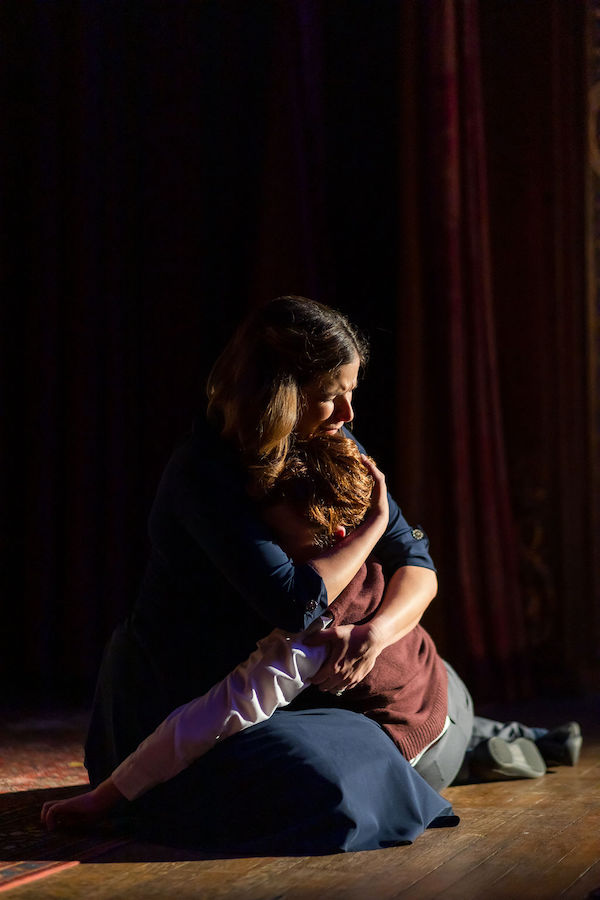Opera Baltimore goes site specific with a mixed, manorial “Turn of the Screw”

Colleen Daly as the Governess in Britten’s The Turn of the Screw, presented by Opera Baltimore. Photo: Kiirstn Pagan/Opera Baltimore
Opera Baltimore, formerly known as Baltimore Concert Opera, presented Benjamin Britten’s The Turn of the Screw Friday night in Mount Vernon’s Garret-Jacobs mansion, now home to the Engineers’ Club. Despite the constraints of a semi-staged performance, strong vocal performances left much to enjoy in this presentation of one of Britten’s most haunting creations.
The 1954 chamber opera dramatizes Henry James’ 1898 gothic horror novella about a young governess brought to a manor house by the absent guardian of children Miles and Flora. Alone with the children and the manor’s aging housekeeper, Mrs. Grose, the governess descends into increasing hysteria as she encounters the malign spirits of the estate’s former valet and governess, Peter Quint and Miss Jessel. The story invites multiple interpretations as whether these are actual supernatural events or the delusions of the governess.
Britten’s inventive score incorporates a wide range of elements, from nods to atonality (in the tone row that serves as a theme throughout the piece) to snippets of folk songs and Anglican church music and bravura vocal writing. Britten and librettist Myfanwy Piper fully realize the spirits as singing characters, while preserving the elements of doubt in the story and leaving the audience to question what we are witnessing.
For this Turn of the Screw, Opera Baltimore took a “semi-staged” approach, relying on the mansion’s gilded ballroom space to add visual excitement. But the semi-staged approach brings its own challenges relative to the concert format, as seen here.
Director Catrin Davies found occasional interesting uses of the space, especially in the supernatural sequences. Yet much of the action was staged in a straightforward manner on the small band stage at the end of the ballroom, leaving long stretches that inevitably felt a bit like a school or church play, despite the professionals onstage.
Where the constraints of a traditional concert format can free singers to invest more in their vocal performance, the semi-staged approach seemed to make the cast more cautious at times, especially in the first Act, where they needed to navigate awkward blocking and transitions in a cramped space. Lacking the cues of either a fully staged production or the clarity of a concert setting, the cast also had difficulty converging on a common dramatic level.
Colleen Daly, as the unnamed Governess, took some time to hit her stride during the slow-burn first Act, with straining in the upper register and some challenges bringing the character’s solo scenes to life. Act 2 found her much more comfortable, displaying a cool, striking soprano voice in the Governess’s compelling moments monologue despairing about Flora’s turn against her and her final exchange with Miles.
As Mrs. Grose, Annie Chester’s bright mezzo shone in scenes like the Act I exchange where she tells the backstory of the manor, though ultimately this felt like a limited characterization relative to some of the other performances onstage.
With the arrival of the spirits of Quint and Miss Jessel towards the end of Act 1 Britten introduces an entirely new set of lyrical musical ideas, offsetting the low-key dread and staid domestic proceedings we’ve seen so far.
Norman Shankle and Amanda Sheriff brought a heady level of commitment to this music, breathing fresh life and direction into the production. Shankle’s tenor soared in Quint’s ascending vocal lines, delivering an exciting and stylish vocal performance, while Sherrif offered a malevolent Miss Jessel replete with menacing physicality, her focused soprano cutting through the room in Jessel’s high-flying music.
The children in Turn of the Screw are cast with an adult soprano in the role of Flora, and a juvenile treble voice as Miles. Here, soprano Robin Steitz made much of the role of Flora, bringing a fully realized physical performance and detailed attention to vocal characterization of the child’s enigmatic moods, while Miles was sweetly sung by Brynn Blair.
Joy Schreier had the Herculean task of playing the entire score from the piano, in a dynamic reading that preserved much of the music’s drama, though, necessarily sacrificing some of the atmosphere produced by the full chamber orchestra. Conductor Michael Sakir ably handled coordination between the piano and singers.
The Turn of the Screw will be repeated 3 p.m. Sunday. operabaltimore.org

